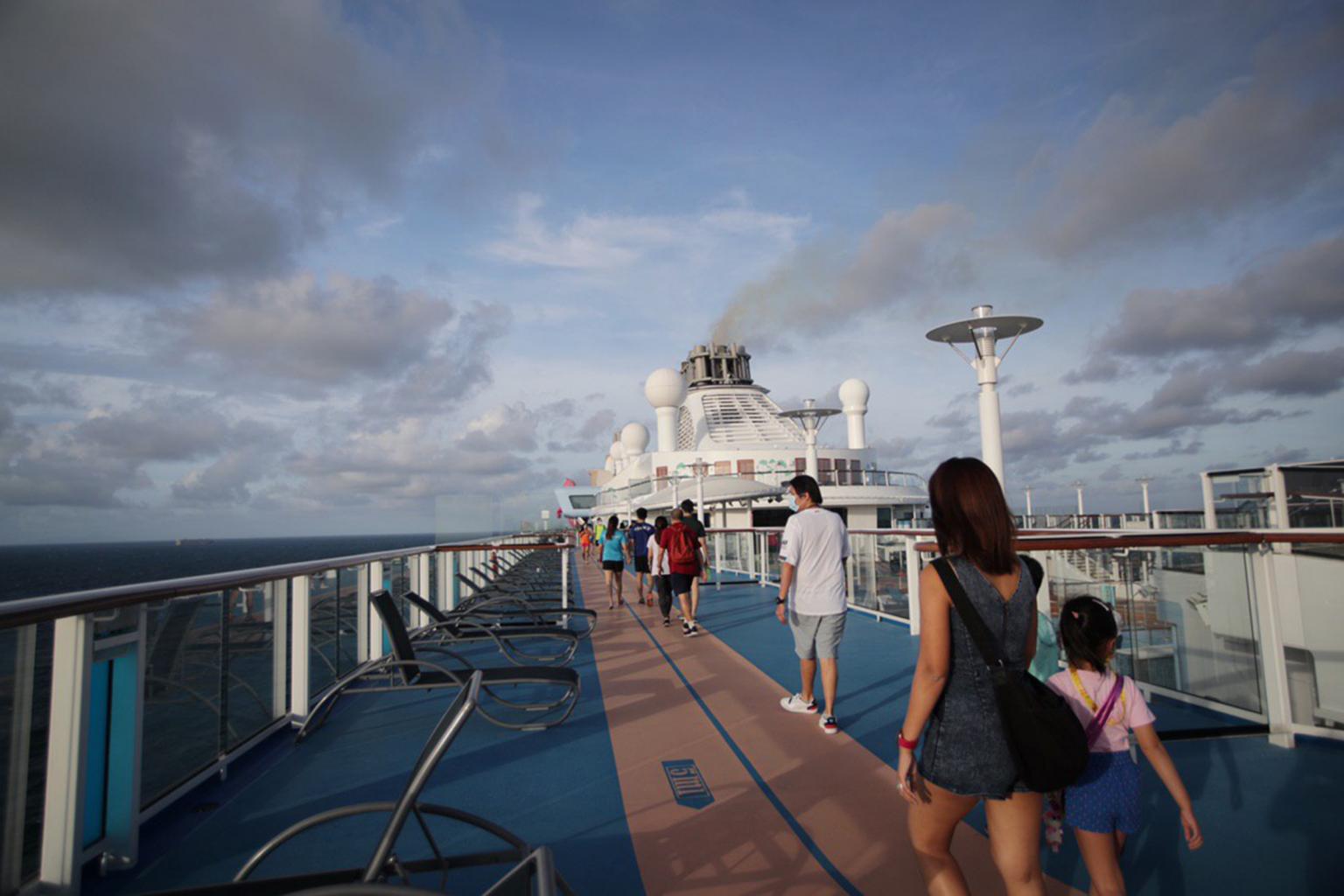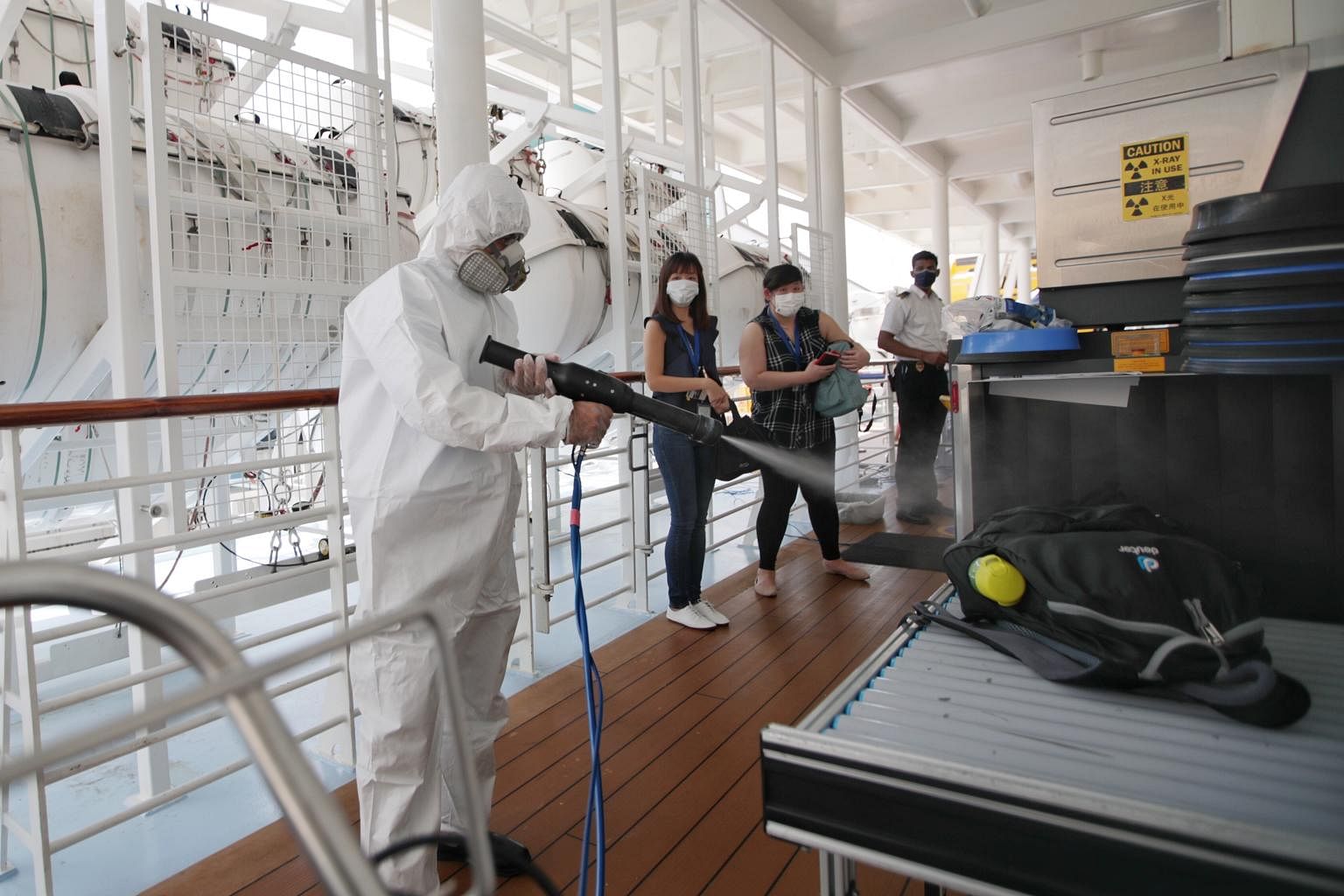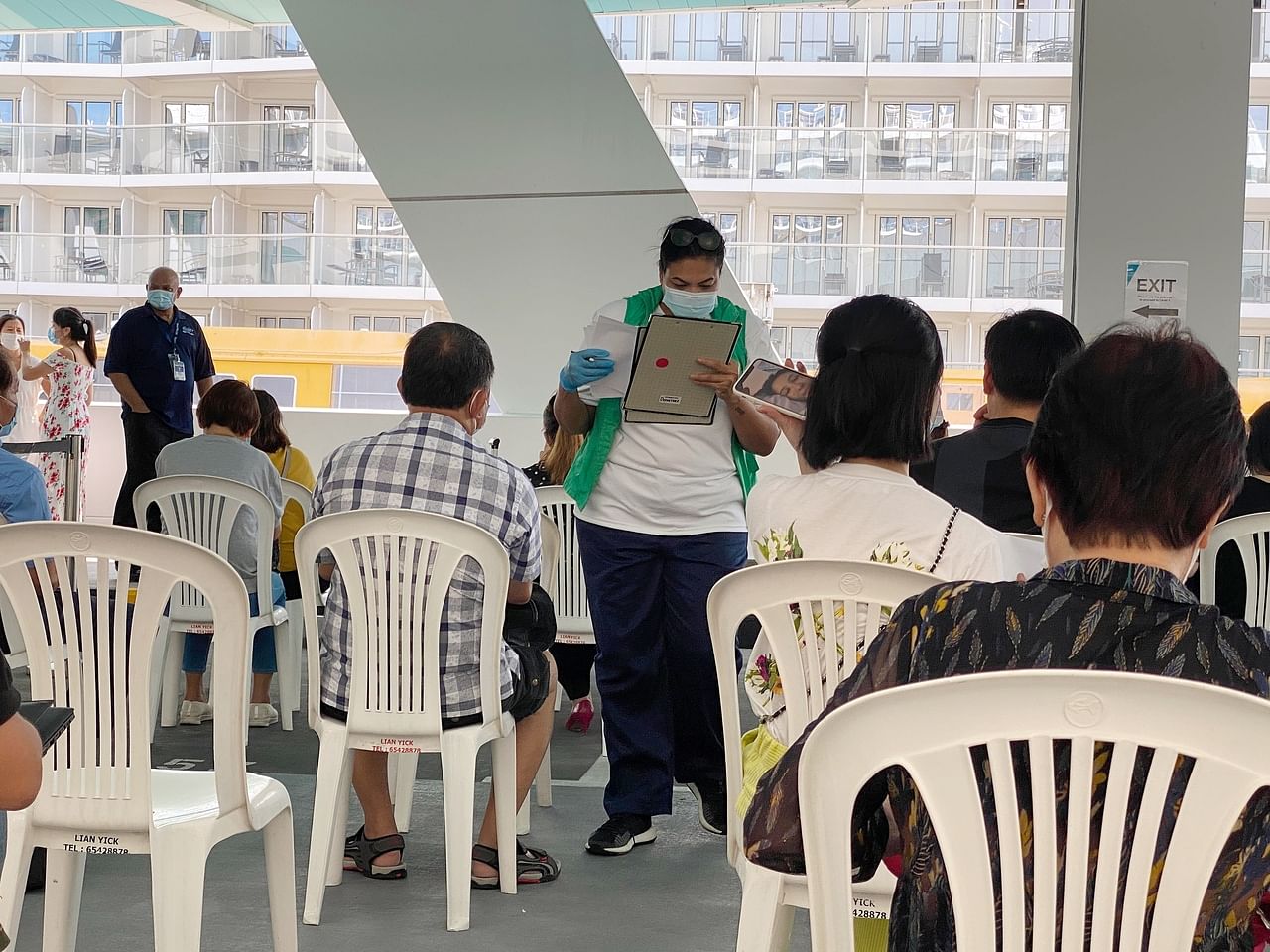Royal Caribbean case: PCR test would not have detected Covid-19 infection in incubation phase, say experts
Sign up now: Get ST's newsletters delivered to your inbox

The Royal Caribbean ship turned back on day three of a four-day cruise to nowhere.
ST PHOTO: GIN TAY
SINGAPORE - No Covid-19 testing regime is foolproof, said experts, when asked how a cruise passenger ended up testing positive for the virus despite being cleared by a polymerase chain reaction (PCR) test prior to the trip.
While the PCR test is highly accurate, it does not detect a coronavirus infection that is still in the incubation phase, which is five days on average.
This could explain why the 83-year-old passenger tested positive for the virus on board the Quantum of the Seas, resulting in the Royal Caribbean cruise ship turning back to Singapore on Wednesday (Dec 9) on the third day of a four-day cruise to nowhere.
The most important issue now, experts said, is to determine if virus transmission happened on the ship. More tests also need to be done on the man, as well as others on the ship.
How did the man get the virus?
Professor Dale Fisher, a senior consultant in the infectious diseases division at the National University Hospital, said a proper investigation is needed to, first, rule out the possibility of a false positive test.
"More tests need to be done, as those who had Covid-19 months ago can still intermittently shed viral fragments that may not even be infectious. But if he is a true positive case, the virus was most likely still incubating when he tested negative pre-departure," Prof Fisher said.
The passenger had taken a mandatory Covid-19 PCR test prior to boarding, which came up negative for the virus. He later reported to the on-board medical centre with diarrhoea, and underwent a mandatory PCR test. He disembarked the cruise ship at about 2pm and was taken by ambulance to hospital, where he underwent further testing.
He was unlikely to have been infected on the ship, Prof Fisher added, given the short duration of the cruise.
Prof Teo Yik Ying, dean of the National University of Singapore's Saw Swee Hock School of Public Health, echoed this view.
The incubation period is five days on average, but can be as long as 14 days, Prof Teo said.
"This means that even though one has been exposed and infected, that person may continue to test negative a few days post-exposure, and only start to shed sufficient virus or exhibit the symptoms later on."
However, there have been reports of extremely short incubation periods of less than two days, so while unlikely, it could be possible that the man was infected during the cruise, Prof Teo added.
Is cruising still a good idea?
Cruises were disallowed on March 13. However, when Covid-19 cases were reined in here, Genting Cruise Lines and Royal Caribbean International were given the green light to offer cruises from November.

"I'm still not convinced that cruises to nowhere were a good idea, but I've been somewhat reassured by the measures in place to reduce the risk of large outbreaks," Prof Cook said.
"We'll see how many other passengers need to be quarantined, and if any of those not quarantined develop infection. Soon we'll see how effective the on-board measures are."
With no testing regime being foolproof, the most critical issue is to determine if virus transmission had happened on the ship, experts stressed.
This will take at least one infection cycle - or two weeks - and contacts of the man will have to be tested to determine if there was spread.
"If there is no spread and the case was completely contained, this means that the system has been effective in preventing transmission, and that will be reassuring if true," Prof Fisher said.
If so, this incident could be looked on positively as a good test of the ship's protocols and infection control measures, he added.
Prof Teo said such incidents serve as a stark reminder why safe management measures must be followed, and why TraceTogether must be used, so that contact tracing protocols are sufficiently effective and robust.
As countries experiment with different strategies to resume activities, cases will surface, such as when Singapore's nightlife sector resumes, he added.
There is no need to be alarmed, as the risk that this infection will spill over to the rest of the community is also extremely low, given Singapore's robust ring-fencing protocols, Prof Teo assured.
"What is important as a community is not to recoil and immediately choose the safest option of barring the activity, unless it is clear the present protocols are inadequate and an accelerated spread to the rest of the community is imminent," he added.
"It will still be safe to cruise, until evidence proves otherwise."
Should the infection be contained despite interactions, then this would bode well for the country in allowing greater resumption, Prof Teo said.
"The incident also proves that there are still cryptic cases and we must continue with our individual measures of mask wearing and social distancing," he stressed.
Associate Professor Alex Cook, vice-dean of research at the NUS Saw Swee Hock School of Public Health, however, was more sceptical of the matter.
"I'm not surprised that it happened eventually, but I'm surprised it happened so soon," he said.
Is testing before a cruise still useful?
Passengers on Royal Caribbean have to do a PCR test 48 to 72 hours pre-departure and show a negative result, while those on Genting do a rapid antigen nasal swab test at the terminal on departure day.

A staff from Raffles Medical calling the Genting Dream Cruise passengers To collect the rapid antigen test at designated colour zone for the rapid antigen test results at Marina Bay Cruise Centre on Nov 6, 2020. Story on pandemic cruising on Genting's World Dream. This is Singapore's first cruise to nowhere for Singapore residents during Covid-19.
PHOTO: ST
PCR tests are higher in accuracy. However, they take longer to process and must be done up to three days prior. There will be a very small window that one could still be infected even after submitting a negative result, Prof Teo said.
"PCR also does not distinguish between an old or new infection, so someone could be shedding non-infectious viral fragments and yield a positive PCR result," Prof Teo said.
The sensitivity of PCR is zero per cent right after infection, but rises to 90 per cent or more around the time of the onset of symptoms - if the case is symptomatic - and slowly falls back down in the weeks after illness, Prof Cook added.
On the other hand, there is no window for possible exposure after testing with Genting's protocol, since the test is done on departure day.
But rapid tests are slightly less sensitive, and there is a small chance that a true infection might be missed, Prof Teo added.
Doing both tests will be better but this might not be practical or feasible. Both tests on their own will not be capable of picking up an infected person that is still in the incubation phase, although given the scheduling of the two regimes, implementing both regimes does reduce the chance of missing an infection, he added.


